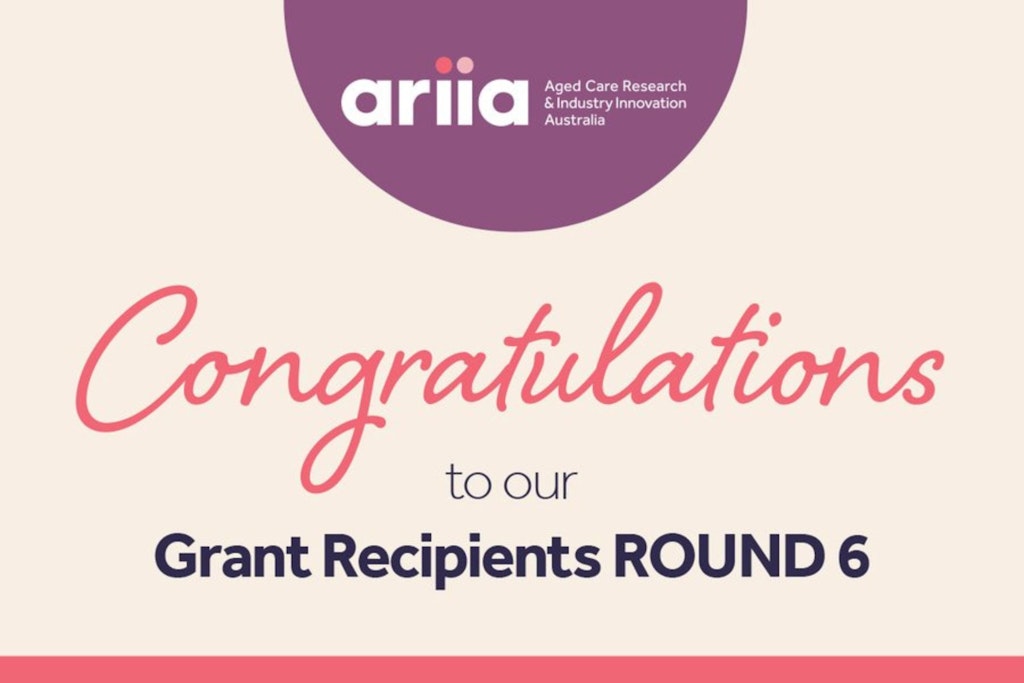ARIIA announces sixth round of Grants Program recipients
Published on 6 November 2023

The sixth and final round of Aged Care Research and Industry Innovation Australia (ARIIA) Grants Program projects have been announced, fast-tracking the rollout of 12 exciting research projects.
The latest ARIIA Grants dig deep into a range of priority areas including dementia care, mental health and well-being, staff burnout and rehabilitation, reablement and restorative care.
- On the workforce front, Royal Freemasons’ Benevolent Institution (RFBI) will partner with Macquarie University to take a strategic approach to supporting managers and staff to recover from burnout. The aim is to reduce turnover and improve resident care.
- Maroba Caring Communities has joined with Sound Scouts HQ and the University of Newcastle to better identify care recipients who may be experiencing decreased quality of life due to hearing loss.
- Warrigal Care will adopt the AI-based NutriTrack program to automate clinical diagnosis and risk predictions from malnutrition. The project is run in partnership with the University of Wollongong and QPS Benchmarking.
Each successful research project will receive up to $160,000. In total, 62 projects have benefited from a combined $16.5 million in grants over the past two years, and there are hopes the Federal Government will continue to fund the impactful program.
For ARIIA Research Director, Professor Sue Gordon, the Grants are vital to continue strengthening the aged care sector while also investigating just how much of an impact new technologies, processes and innovations can have on ageing Australians.
“Staff burnout has been identified as a challenge for the aged care sector, and a serious issue for the Aged Care Quality and Safety Commission, so it is good to address this critical issue through a number of these project. It is also pleasing to see new ventures using technology to make an impact in urban, regional and remote areas across Australia,” Professor Gordon said.
“Collaboration is the heart of ARIIA’s activities we are grateful for the partnerships and funding we have received from the Australian and State Governments and Flinders University that enable us to work with the aged care sector to make significant improvements.”
Unlike many other research projects, ARIIA-funded projects must be completed within 12 months, ensuring that their findings can quickly be adopted if effective. Therefore, the sector can benefit from industry-specific research without delay.
“This is such a refreshing change, as historically, it takes around 17 years to translate research discovery and evidence into practice, and even then, only about 14% of research evidence is fully implemented and integrated,” Professor Gordon added.
“It is also good to see aged care providers and research organisations working together and partnering with others to deliver improvements in areas of need, and as they must make a co-contribution to their project, they have a firm commitment to it.”
Successful Round 6 Grant recipients:
1. Hunter Medical Research Institute in partnership with Maitland Community Care Services for the Implementation and evaluation of their ESTEEM Program for recovery and rehabilitation for stroke survivors. (Restorative Care, Reablement and Rehabilitation; Social Isolation; Mental Health and Wellbeing; Urgent and Critical Need)
2. MG Food Solutions in partnership with Calvary Aged Care and Flinders University for their project that measures consumer health benefits and addresses malnutrition by switching from clinical dietary supplements to a food-first approach. (Technology in Age Care, Urgent and Critical Need)
3. The University of Wollongong in partnership with QPS Benchmarking and Warrigal Care to implement their AI Tool NutriTrack project to automate clinical diagnoses and risk predictions for older aged care residents suffering from malnutrition. (Dementia; Social Isolation; Mental Health and Wellbeing; End of Life and Palliative Care, Technology in Aged Care, Clinical Governance; Urgent and Critical Need)
4. Monash University in partnership with BlueCross for their project that upskills aged care workers to become sleep coaches for older adults and deliver evidence-based feasible sleep interventions for people in their care. (Dementia; Restorative Care, Reablement and Rehabilitation; Meaningful Lifestyle Activities)
5. Anglican Community Services in partnership with Wesley Mission and Western Sydney University for their Older Persons Wellbeing Network project, which is a collaborative, stepped care, peer-based approach to navigating life transitions and improving mental well-being. (Mental Health and Wellbeing)
6. Neuroscience Research Australia in partnership with HammondCare for the development and implementation of a strategy for reablement uptake for people living with dementia in the community. (Dementia; Restorative Care, Reablement and Rehabilitation)
7. Southern Cross Care WA in partnership with Edith Cowan University to create an evidence base for the timely introduction of the ‘No One Dies Alone’ program into residential aged care homes. (End of Life and Palliative Care)
8. Sound Scouts HQ in partnership with Maroba Caring Communities and the University of Newcastle for their project to identify people with hearing loss that is impacting their quality of life using Sound Scouts digital hearing testing technology. (Dementia; Restorative Care, Reablement and Rehabilitation; Social Isolation; Mental Health and Wellbeing; Technology in Aged Care)
9. The University of Southern Queensland in partnership with Oral Tech AI, Hawkshaw Pty Ltd and UnitingCare Community’s BlueCare, for their Nowlanvil project that optimises oral health awareness, education, screening and referral using a digital health platform. (Technology in Aged Care)
10. Southern Cross Care (NSW & ACT) in partnership with Queensland University of Technology and Automation for Humanity for their Sit & Shower automatic bathing device for residents in aged care homes. (Mental Health and Wellbeing; Staff burnout; Technology in Aged Care)
11. Clayton Church Homes in partnership with the University of South Australia, Southern Cross Care (SA, NT & Vic) and Geriatric Care Australia for their project that supports aged care staff in the identification, monitoring, and support of changed behaviours for residents with dementia. (Dementia; Clinical Governance)
12. Royal Freemasons’ Benevolent Institution in partnership with Macquarie University for their sustainable, multi-level, capability-building strategic approach that supports managers and employees to recover from burnout, leading to reduced employee turnover and ultimately improved care for residents. (Staff burnout; Urgent and Critical Need)